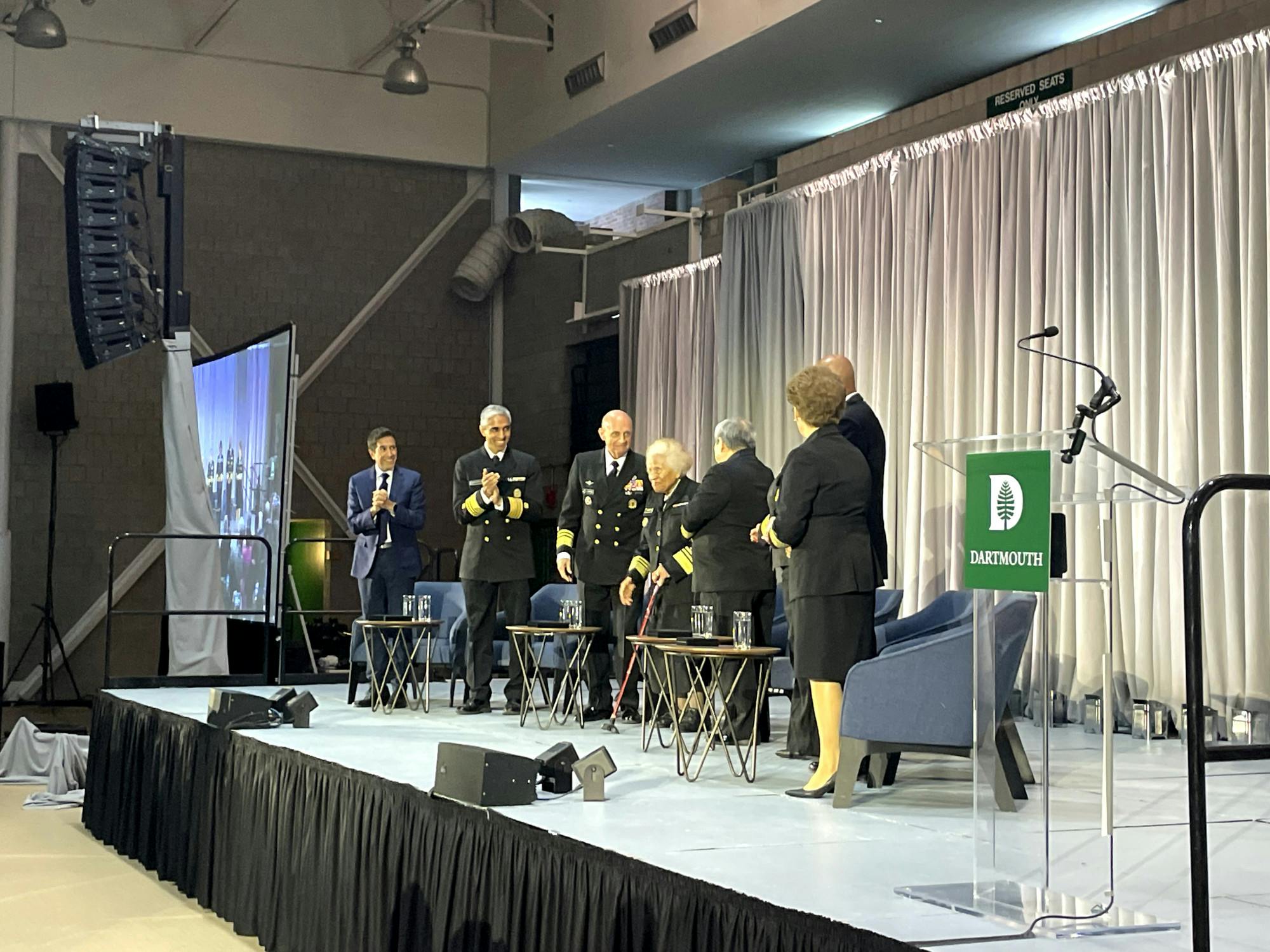On Sept. 28, Dartmouth hosted U.S. Surgeon General Vivek Murthy and his seven living predecessors for a panel discussion titled “Future of Mental Health and Wellness.” The event ran from 1 to 3 p.m. in Leede Arena and was moderated by CNN Chief Medical Correspondent and neurosurgeon Sanjay Gupta. More than 1,400 people attended the event in person or watched online, according to Dartmouth News.
During the discussion, Murthy and his predecessors discussed their concerns about the national mental health crisis and how to combat it. The panel marked the first time in 25 years that all living surgeons general convened in one place. Former surgeon general David Satcher, who could not travel, contributed a video statement that was displayed during the discussion following President Sian Leah Beilock’s opening remarks.
The meeting, which was first announced in an email to campus from the President’s Office on Aug. 7, marked a premier event for Beilock, a cognitive scientist. Beilock, who listed mental health as the first of her “five key areas of focus” in her inaugural address on Sept. 22, said she will continue to press the issue during her presidency. On Oct. 10, the College is slated to unveil a comprehensive plan for mental health and well-being.
During the discussion, Gupta asked each panel member varying questions that all related to the mental health crisis and steps to repair it. Most of the panel members thanked Satcher, who served as surgeon general from 1998 to 2001, and C. Everett Koop ’37, who served under President Ronald Reagan, for their mentorship.
Satcher, who released the first-ever surgeon general’s report on mental health while in office, called for the healthcare system to not only treat mental illnesses but remove financial barriers and social stigmas to promote wellness.
Richard Carmona, who served from 2002 to 2006, at one point spoke specifically about the impact of war on mental health. Carmona explained how helping his son, an Iraq War veteran, receive PTSD treatment has been an extremely difficult process; Carmona himself is a Vietnam War veteran. He urged for better mental health care systems for soldiers, veterans and their families.
Regina Benjamin, the surgeon general from 2009 to 2013, emphasized that mental health is multifaceted and complex.
“Health does not occur in the doctor’s office or in a hospital alone,” Benjamin said. “It occurs where we live, where we learn, where we work, where we play, where we pray — everything that we do.”
Antonia Coello Novello, who was the first woman to serve as surgeon general from 1990 to 1993, said health care providers are struggling with a mental health crisis of their own, inhibiting assistance efforts and compounding the crisis.
“We, the ones who are supposed to take care of you, also have a problem, and no one is taking care of us,” Novello said.
The mental health crisis has only been exacerbated because of substance abuse, according to Jerome Adams, who served as surgeon general from 2017 to 2021 under President Donald Trump.
“We have this chicken-and-egg phenomenon where people are causing mental health disorders because of substance abuse,” Adams said. “But we also know that in many cases people are self-medicating their pain away because we don’t have enough resources out there to treat their addiction, to treat their anxiety, and so they turn to substances.”
Murthy said that in the face of unprecedented loneliness and mental health issues, community is one of the keys to repairing the crisis.
“It’s that ability to be kind, to be generous, to give and to receive love,” Murthy said. “That is the moral reawakening that we have to engineer together in our country. It’s how we stitch together the social fabric of our nation, and on that foundation we can build healthy institutions.”
For attendee Sahil Koul ’26, Murthy’s message was particularly moving.
“There is something much bigger than politics … and that is our relationships with one another,” Koul said. “The conclusion that rebuilding our interconnected social fabric requires a deeper look into our relationships and how we show kindness and support stuck with me.”
Following the discussion, Beilock appeared back on stage to present each member of the panel with the C. Everett Koop Legacy Medal for their contributions to public health. Associate dean for diversity, equity, and inclusion at the Geisel School of Medicine Lisa McBride also received a medal. According to Beilock, McBride was “the driving force behind bringing the surgeons general together on our campus.”
Avi Singh ’26, who attended the event in person, said he thinks the steps Beilock and the College are taking will influence other institutions.
“It wasn’t Harvard that did this, or Columbia, any of these places in popular cities, but it was Dartmouth, in the middle of nowhere, that was able to convene all these people,” Singh said. “This is a huge message across the board — across the country, even the world — that mental health should be at the top of everybody’s priorities.”
Correction Appended (Oct. 3, 10:10 a.m.): A previous version of this article state that the meeting of the surgeons general was announced by Beilock at her inauguration on Sept. 22. The article has been updated to reflect that it was first announced in a campus wide email from the President’s Office on Aug. 7.
In addition, Koul is a writer for The Dartmouth's Arts section. We regret this oversight.




